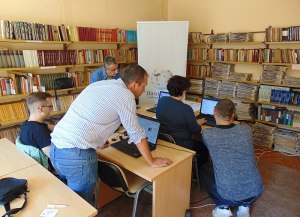The year of 2019 marks the 270th anniversary of the birth of foremost German writer Johann Wolfgang von Goethe. For that reason, Shared Knowledge collaborated with the Goethe-Institut in Skopje on an initiative to translate content from German Wikipedia with the goal of bringing the German culture closer to the Macedonian readers. The collaboration resulted in activities split into two projects that were carried out in two phases – the first one at the National and University Library in Skopje from March to June under the name WikiLiga, and the second one at the city libraries of Strumica, Bitola, Veles and Kumanovo from September to December under the name WikiStadtklub.
Phase 1: Kicking off with edit-a-thons and an editing league
The project was implemented during the spring with a principal idea to make a blend between edit-a-thons as introductory events to teach newbies on the basics of Wikipedia and writing contests in a league format as an incentive for further active participation, hence the name WikiLiga. It consisted of four six-hour edit-a-thons followed simultaneously by three-week writing contests that covered the topics: German literature, German film, German music and World Heritage Sites in Germany. All edit-a-thons were held at the National and University Library in Skopje on Saturdays. They were scheduled as follows:
- German literature edit-a-thon on 30 March (writing contest until 19 April)
- German film edit-a-thon on 20 April (writing contest until 10 May)
- German music edit-a-thon on 11 May (writing contest until 31 May)
- World Heritage Sites in Germany edit-a-thon on 1 June (writing contest until 21 June)

Interested participants could register for each edit-a-thon by filling up a registration form that was linked from the announcements published in the media. Organisers contacted all interested participants in advance and provided them with lists of 100 proposed articles that were put on flip charts exhibited during the events to prevent edit conflicts. However, editing of non-listed articles on the topics was also allowed. A brief hands-on training on using the Content Translation tool was provided to first-time editors at the beginning of each event and mentorship was offered while editing. All participants who have contributed to at least one article were handed certificates of participation with the three most prolific being awarded prizes in the form of vouchers for technical equipment or books.

The final choice of topics was made from a slightly longer list through a consensus reached with Goethe-Institut. Despite the wide scope as suggested by their titles, the lists of proposed topics were systematically divided into categories and contained items of highest notability. Furthermore, German music as a topic had limited scope to popular music only. Communication played an important role during the writing contests with participants being notified about the approaching deadlines and animated in various ways. In this light, the annual Festival of New German Cinema held in early May overlapped with the topic of German film and motivated the creation of articles on the films included in the programme.
Phase 2: Setting up clubs of editors in other cities
After the success of WikiLiga, the initiative was expanded to four other cities in a new project known as WikiStadtklub that was implemented during the autumn. The format of the new project was a bit modified and it consisted of four three-hour edit-a-thons with no subsequent writing contests in the cities of Strumica, Bitola, Veles and Kumanovo. Another change was the free choice of topics so that participants at every event were allowed to write articles on each of the four topics included in WikiLiga. All edit-a-thons were held at the city libraries on weekdays. They were scheduled as follows:
- Strumica edit-a-thon on 25 September
- Bitola edit-a-thon on 24 October
- Veles edit-a-thon on 20 November
- Kumanovo edit-a-thon on 5 December

Similarly to WikiLiga, there was a registration form that interested participants had to fill up and it was appended to the announcements published in the media, lists of topics were prepared for participants in advance, hands-on training on using the Content Translation tool along with mentorship while editing was provided, and certificates of participation were handed to all those who have contributed to at least one article.
Outcome and impact
The initiative had positive impact on community growth and content coverage as indicated by the number of about 25 first-time editors out of 38 participants who created or improved more than 350 articles on the Macedonian Wikipedia. Gender gap was not an issue and at least half the participants in every event was made up of female editors. There are also tracks of editor retention to some degree, as three first-time editors continued contributing after the end of the projects and one of them has also volunteered in staging other events.

Can you help us translate this article?
In order for this article to reach as many people as possible we would like your help. Can you translate this article to get the message out?
Start translation